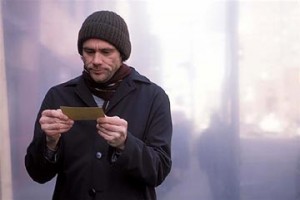Eternal Sunshine of the Spotless Mind
 I am awestruck by what Charlie Kaufman was able to get into the Eternal Sunshine script. The way that director Michel Gondry’s style, which got in the way of Kaufman in Human Nature, fit so perfectly. The poignancy of watching the house fall apart at the beach was overpowering. Spike Jonze knows to let Kaufman’s ideas play out, and so Being John Malkovich and Adaptation are very spare and unstylized, featuring a lot of intimate hand held. But here, Gondry’s visual tricks and focus on drawing attention to himself is not a hindrance, as the CGI is comedic (the little boy scenes and Elijah Wood’s head at Barnes & Noble as he keeps turning around), moving (the notion of running away from your past so it won’t catch up with you, and in this case disappears), and frightening (the erased faces in the dark at the doctor’s house).
I am awestruck by what Charlie Kaufman was able to get into the Eternal Sunshine script. The way that director Michel Gondry’s style, which got in the way of Kaufman in Human Nature, fit so perfectly. The poignancy of watching the house fall apart at the beach was overpowering. Spike Jonze knows to let Kaufman’s ideas play out, and so Being John Malkovich and Adaptation are very spare and unstylized, featuring a lot of intimate hand held. But here, Gondry’s visual tricks and focus on drawing attention to himself is not a hindrance, as the CGI is comedic (the little boy scenes and Elijah Wood’s head at Barnes & Noble as he keeps turning around), moving (the notion of running away from your past so it won’t catch up with you, and in this case disappears), and frightening (the erased faces in the dark at the doctor’s house).
One thing that colored the movie for me, I saw it at a rather low rent theater in my neighborhood. In the bottom left corner of the screen, someone, in enormous letters, had used some sort of permanent ink or paint, and written the words KILL ME. This was only visible when the image was white, and so all the scenes in the snow and on the ice took on an extra level of meaning. After the movie was over, I suggested to the manager that if he couldn’t get it off, he should move The Passion of the Christ into that theater next.
There were so many things thrown in and gradually developed beautifully, Kirsten Dunst’s relationship with Tom Wilkinson, Wood’s desperation to be liked and to know and understand love and pain (it’s important that he was there for Clem’s erasing of Joel, because he sees how much pain Joel has caused her, and yet wants to repeat it for himself), the motif of how all of the apartments in the film, especially Joel’s, were so drab and forgettable, which ties in with the idea of memory loss, the enormous oversight of relying on a card to inform others to not mention a person to a former loved one, as it excludes consideration of human curiosity and impulsive feelings.
 A person who suggests that Kaufman is a one-trick-pony or simply relies on gimmicks is missing something, because he really understands about pain and regret, and the way that you can learn from your mistakes, and that erasing them to “go back to where you were before, when you were happy,” is an even larger mistake. The ending he presents is more than perfect because it is a double edged sword. Hell, it’s a sword with endless prongs. Clementine and Joel feel comfortable and renewed (or better yet, reknewed) because they are oddly familiar with each other. They get to start again. But they also know that they will fall right back into the same pattern, and we know that as well, and that makes the conclusion extremely sad. I know people like Clem and Joel, and I have been both people, the person who energizes the relationship and makes the other person believe that their life is more exciting with you around. I have only been Joel for 3 days, and of course, immediately fell in love with the girl, but more the thought of her, rather than the actual person. I knew she was the type who was aggressive and went for what she wanted and as a result, got bored rather quickly. But I was willing to risk it. There is something so adventurous about allowing yourself to get hurt, especially when you know in advance how much pain it will cause you. That is the special meaning of the film, when people let themselves get hurt, that they are willing to exchange months of emotional pain and torture for a few nuggets of perceived happiness.
A person who suggests that Kaufman is a one-trick-pony or simply relies on gimmicks is missing something, because he really understands about pain and regret, and the way that you can learn from your mistakes, and that erasing them to “go back to where you were before, when you were happy,” is an even larger mistake. The ending he presents is more than perfect because it is a double edged sword. Hell, it’s a sword with endless prongs. Clementine and Joel feel comfortable and renewed (or better yet, reknewed) because they are oddly familiar with each other. They get to start again. But they also know that they will fall right back into the same pattern, and we know that as well, and that makes the conclusion extremely sad. I know people like Clem and Joel, and I have been both people, the person who energizes the relationship and makes the other person believe that their life is more exciting with you around. I have only been Joel for 3 days, and of course, immediately fell in love with the girl, but more the thought of her, rather than the actual person. I knew she was the type who was aggressive and went for what she wanted and as a result, got bored rather quickly. But I was willing to risk it. There is something so adventurous about allowing yourself to get hurt, especially when you know in advance how much pain it will cause you. That is the special meaning of the film, when people let themselves get hurt, that they are willing to exchange months of emotional pain and torture for a few nuggets of perceived happiness.



